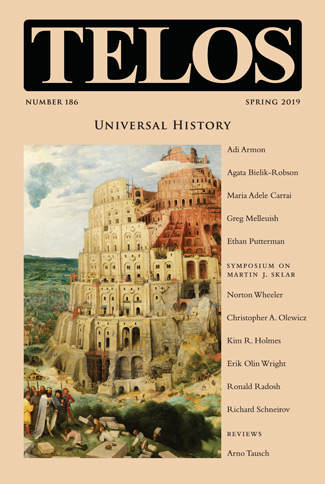Erik Olin Wright’s “Martin Sklar’s Theory of Capitalism and Socialism” appears in Telos 186 (Spring 2019). Read the full article at the Telos Online website, or purchase a print copy of the issue in our online store. Individual subscriptions to Telos are available in both print and online formats.
 This essay explores how Martin Sklar’s typology of the patterns of thought that have animated social and political struggles in capitalist societies since the mid-nineteenth century can, with some modification, be incorporated into a more general analytical framework for thinking about alternatives to capitalism. Sklar frames his analysis primarily in terms of two contrasts—between what he calls “utopian” and “realist” modes of thoughts, and between capitalism and socialism as ways of organizing political-economy institutions. He supports a realist mode of thought that examines the ways in which socialist elements emerge within capitalism, creating various kinds of hybrids through what he calls the “capitalism/socialism interplay.” The prospects for progressive social change come out of that interplay. This essay proposes modifying Sklar’s framework in two respects: First, rather than rejecting the utopian mode of thought, utopian models can be useful as a way of clarifying the normative foundations of struggles for human emancipation and the logical connections between different elements of proposed alternatives to existing institutions and social structures. Second, while Sklar is correct that real economic systems contain hybrids of capitalist and noncapitalist elements, it is a mistake to lump all relevant noncapitalist elements under the rubric “socialist.” Specifically, it is useful to distinguish statism from socialism. This creates a more nuanced conceptual map of possibilities and points more clearly to the problem of democratizing state and democratizing the economy as the central task of progressive politics.
This essay explores how Martin Sklar’s typology of the patterns of thought that have animated social and political struggles in capitalist societies since the mid-nineteenth century can, with some modification, be incorporated into a more general analytical framework for thinking about alternatives to capitalism. Sklar frames his analysis primarily in terms of two contrasts—between what he calls “utopian” and “realist” modes of thoughts, and between capitalism and socialism as ways of organizing political-economy institutions. He supports a realist mode of thought that examines the ways in which socialist elements emerge within capitalism, creating various kinds of hybrids through what he calls the “capitalism/socialism interplay.” The prospects for progressive social change come out of that interplay. This essay proposes modifying Sklar’s framework in two respects: First, rather than rejecting the utopian mode of thought, utopian models can be useful as a way of clarifying the normative foundations of struggles for human emancipation and the logical connections between different elements of proposed alternatives to existing institutions and social structures. Second, while Sklar is correct that real economic systems contain hybrids of capitalist and noncapitalist elements, it is a mistake to lump all relevant noncapitalist elements under the rubric “socialist.” Specifically, it is useful to distinguish statism from socialism. This creates a more nuanced conceptual map of possibilities and points more clearly to the problem of democratizing state and democratizing the economy as the central task of progressive politics.


